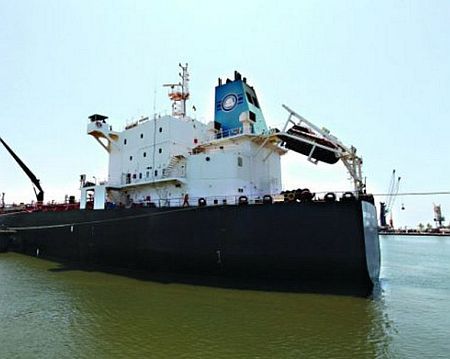
About half of state-owned Libyan shipping firm’s 24-strong fleet of tankers is sailing again after months of paralysis due to sanctions and a freeze on assets belonging to the family of former leader Muammar Qaddafi, a company manager said.
The General National Maritime Transport Company (GNMTC) was on US sanctions lists during the Libyan conflict, but has since been removed.
Captain Tarek Youssef Said, a committee member for acquisitions on the company’s management board, said GNMTC was in the process of resuming operations and shedding its former associations with the Qaddafi family.
“The OFAC (Office of Foreign Assets Control) decision has helped us get back to business after an eight-month stoppage. It’s about 50/50 (tankers) that are in action and we hope to have the rest in the next few weeks,” he said this week, wearing a tricolor symbol of the new Libyan flag pinned to his breast.
Said added the company was now dealing with the necessary paperwork to get the remainder of the fleet back up and running after some tankers managed by an international company were laid up off Malta and Singapore.
Lost business due to sanctions and high costs associated with servicing vessels stranded for most of the Libyan conflict will take a toll on this year’s profits, he said.
“We will suffer heavy losses in 2011 because of the costs of managing all the oil vessels over the past eight months,” Said said, but added there were no incidents of tankers being detained this year.
Average earnings in the crude tanker sector are expected to stay bleak in 2012 as the sector continues to struggle with a glut of vessels ordered when the global economy was strong, and also because of the ongoing economic turmoil.
GNMTC officials are sitting alongside members of the National Oil Corporation (NOC) in a series of negotiations taking place in Turkey with managers from top oil firms over 2012 crude oil supply contracts.
GNMTC is now operating as the NOC’s shipping arm, Said said.
This means that oil companies and trading houses trading crude oil and products with Libya will have the option of using Libyan vessels for tankers sold on a delivered basis.
Qaddafi’s son Hannibal officially had a consulting role in the GNMTC but often made decisions that had a direct impact on its daily operations before the revolution, according to Said.
“We now want to have a company based on professionalism. We want to delete the past,” he said.
The extent of the Qaddafi family’s influence on the firm’s daily operations is suggested by the fact that one of the tankers, a Suezmax, was named after his daughter Aisha.
Aisha fled the country along with Hannibal Qaddafi in August to Algeria.
The tanker has now been renamed “February 17” to honor the start of the uprising against Qaddafi, Said said.
He said a new bulk carrier that has become the shipping fleet’s 25th vessel will be named Jabel Nfusa after Libya’s western mountains where some of the fiercest battles took place in the run up to Tripoli’s fall in August.
Unlike other major state-owned companies such as the NOC, the GNMTC has so far avoided the major overhaul of management, with all senior staff still in place.
“We haven’t had any change on the board of directors,” Captain Tarek Youssef Said explained, adding that the chairman from before the revolution Captain Ali Belhaj was still in his post.
(ArabNews)
We use cookies to improve your experience. By continuing to use our site, you accept our Cookies, Privacy Policy,Terms and Conditions. Close X